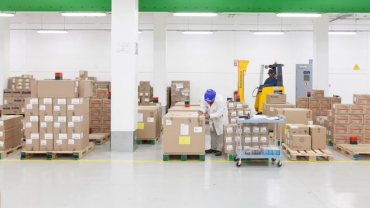
PwC Podcast: Ukraine’s news ad hoc# 2. VAT and how to deal with it in adopting the simplified taxation system
08/04/22
Our second episode focuses on news from the tax front lines, in particular, VAT in the context of adopting the simplified tax system. Our colleagues, Inna Andrushchenko, Head of the VAT practice at PwC Ukraine, and Yulia Shyshko, Manager at the VAT practice, PwC Ukraine, discussed these and other topics with Artem Krykun-Trush, Attorney, Manager at White Collar Crimes, PwC Ukraine.
Artem: Inna, Yulia, hi. Welcome to the second episode of PwC: Ukraine’s news ad hoc.
These days, a significant number of businesses that continue operating need a reduced tax burden and a simplified compliance process. Can you tell us more about the general conditions of the simplified tax system, which are offered to the business now.
Inna Andrushchenko: Thank you. First of all, I would like to give credit to our government for supporting Ukraine's economy and willingness to help the business that continues operating. That helps Ukrainians earn their wages and helps the government to receive taxes and safeguard the overall economy.
The Ukrainian Parliament has indeed eased the requirements for application of the simplified taxation system.
In particular, starting from 1 April 2022, Ukrainian Parliament increased the eligible revenue to UAH 10 billion per annum, removed restrictions on the number of employees and reduced the list of activity types not covered by the system. Moreover, a new draft law has already been passed (yet to be signed by the President), which permits application of the simplified tax system regardless of the level of revenue.
As for the tax rate, a reduced unified tax rate of 2% is used. In addition, all transactions of taxpayers opting for the simplified tax system are exempt from VAT. The taxpayer is not required to file VAT returns as long as the simplified system is applied.
Yulia Shyshko: I would like to add that conditions for using and adopting the simplified system may be subject to further changes. The Parliament is considering a number of draft laws in this area, so we can expect new changes or clarifications soon. For example, although we are discussing VAT today, any losses and overpaid corporate profit tax (“CPT”) amounts will be frozen for CPT purposes and can be utilised once the taxpayer returns to the general taxation system. This wasn't even on the agenda recently.
Artem Krykun-Trush: So who are the simplified taxpayers?
Yulia Shyshko: Simplified taxpayers are those applying the simplified tax system. I think many routinely associate simplified taxpayers with individual entrepreneurs. However, the fact is that there were legal entities applying the simplified tax system. Now, however, a significant number of restrictions for the legal entities have been lifted.
Artem Krykun-Trush: Does this mean that all VAT payers can now adopt the simplified system?
Inna Andrushchenko: Almost. Taxpayers who cannot adopt the simplified tax system include those whose business involves gambling, lotteries, betting, foreign currency exchange or excisable goods and natural resources (subject to certain exceptions), as well as financial companies, security registrars, detached units of legal entities not applying the simplified system and non-residents.
Artem Krykun-Trush: Let’s move on to the question many VAT payers were concerned about. Will the registration as a VAT payer be cancelled for simplified taxpayers?
Inna Andrushchenko: The Tax Code was amended recently to include a clear wording that the registration as a VAT payer will not be cancelled, but rather will be deemed suspended as long as the simplified tax system is applied.
Artem Krykun-Trush: I see, and what will happen to the account in the electronic administration system?
Yulia Shyshko: The balance registered in the Electronic VAT Administration System is not recorded for the duration of using the simplified system. This means that the account should have a ‘frozen’ status during this time.
Artem Krykun-Trush: And what effect will this frozen status have on the tax credit of simplified taxpayers? In fact, taxpayers may have significant accumulated input VAT balances.
Inna Andrushchenko: Input VAT incurred before the adoption of the simplified system will be carried forward.
However, for goods, services, non-current assets for which input VAT was recognised and which were supplied or sold while the taxpayer applied the simplified system, compensating VAT liabilities will need to be assessed similar to those used in non-VAT taxable transactions.
Such taxpayers are also not eligible for tax credit on goods, services and non-current assets purchased while the simplified tax system was applied.
Yulia Shyshko: Therefore, all transactions during the application of the simplified system are effectively exempt from VAT with the respective implications.
Artem Krykun-Trush: And what about non-current assets used in non-taxable transactions during such a period, but were not sold or disposed of? Should compensating VAT liabilities be assessed on such non-current assets?
Inna Andrushchenko: It is a very interesting and complex question with no clear answer available at this point. Based on the effective regulations in place, there are arguments to support the position that tax liabilities should only be assessed on the non-current assets sold.
Yulia Shyshko: Inna, I would like to point out to our audience that where unclear regulations exist, tax authorities may interpret them in a fiscal sense and assess VAT also on non-current assets that were not sold but were used for non-taxable transactions while the simplified system was applied.
For example, we as a company own a tractor. If we sell it after adopting the simplified system, then everything is very straightforward: no VAT on sale, but the respective input VAT needs to be adjusted. However, if we use the tractor to work the field in order to grow beets and sell them without VAT, then this represents use without sale and no clear answer is available here. Such use in transactions exempt from VAT would normally also require adjustment of input VAT.
Of course, we hope that the legislator will address the lack of clarity in the special rules in the next wave of amendments or that tax authorities will issue clarifications in this regard.
Inna Andrushchenko: Yes, Yulia, thank you. And while we are waiting for clarifications or legislative amendments, I would also like to add that these offsetting VAT liabilities can even be adjusted based on general Tax Code provisions in the period when such non-current assets are used in VATable business transactions (i.e. as soon as the taxpayer returns to the general taxation system).
Artem Krykun-Trush: So, in your opinion, what is the best course of action: to make the respective amendments in the legislation or to wait until the clarification becomes available? You’re saying that the tax authorities may take a fiscal approach, so it is likely that the clarification will also be fiscal in nature.
Inna Andrushchenko: I believe that, of course, it would make more sense to amend the Tax Code to set out clear rules. If no amendments are made and instead, certain interpretation is allowed for tax authorities, then, even when individual tax consultations are positive, tax authorities may still take a fiscal approach during their tax audit, and the dispute would then end up in court.
Artem Krykun-Trush: Yulia, Inna, thank you. And another area of concern - what happens to VAT on imports for the simplified system adopters?
Yulia Shyshko: Import of goods by simplified tax system adopters is exempt from VAT(except for the goods originating or imported from Russia, Belarus or occupied territories of Ukraine).
Artem Krykun-Trush: And what will happen after the victory? Will the new simplified tax system disappear?
Inna Andrushchenko: The simplified tax system will not disappear after the victory, but it will only apply to a limited range of taxpayers with insignificant revenues, as was the case before. Unless legislation is amended, large businesses will have to return to the taxation system they applied before, and they will continue being VAT payers.
If no amendments to the law are passed, upon returning to the general taxation system, the electronic VAT administration system will resume operating and the taxpayer will have the right to recover input VAT and the obligation to assess VAT liabilities.
Artem Krykun-Trush: Is the simplified taxation system more beneficial from the VAT perspective than e.g. the general tax system?
Inna Andrushchenko: Not necessarily. Let’s say, if the VAT payer has more input VAT than output VAT from 1 April until the end of martial law, then the simplified system is a less beneficial option. Such taxpayers include, for example, exporters.
At the same time, there are very limited options available to utilise input VAT during martial law. One could hardly expect prompt recovery from the budget. Besides, it is theoretically available for a very limited number of transactions.
Yulia Shyshko: And it the VAT payer generally generates large VAT balances payable, then the simplified system reduces the cash outflow from VAT.
In addition, in considering the transfer to the simplified system, the taxpayer should discuss it with its counterparties. For example, if most suppliers decide to transfer to the simplified tax system, then such transfer becomes more attractive for the buyer as well. Similarly, if the buyer has adopted the simplified tax system, then it would not benefit from purchasing goods or services from VAT payers (because a VAT payer will charge a 20% VAT, which the buyer will be unable to recover). We have already assisted our clients in estimating the tax burden from adoption of the simplified system and analysed various scenarios in relation to their counterparties. Under the scenario when the majority of counterparties switch to the simplified system, the company would benefit from adopting it as well.
One should keep in mind that the concept of suspending registration as a VAT payer is completely new in Ukraine, so certain technical challenges are possible. So we just have to wait and see how it works in practice. In any case, we hope that tax authorities will tackle any potential routine issues as soon as possible.
Artem Krykun-Trush: So to summarise the above, what are the top tips you could give our audience? What are the do's and don’ts?
Inna Andrushchenko:
Tip 1 - do not treat the simplified tax system as the be-all and end-all that is right for everyone. In each case, you should assess the expected tax implications from the existing tax system and the simplified tax system, compare them and only then make an informed decision (and, moreover, you should consider other taxes as well, not just VAT).
Tip 2 - keep track of tax law developments. Legislation evolves very quickly. Key weaknesses of the simplified system have already been addressed. Further amendments could either add clarity or create additional issues.
Tip 3 - trust in Ukraine and its Armed Forces. If you are in a position to do so, you may prepay your taxes.
Artem Krykun-Trush: Thank you very much for this valuable conversation and tips. I’m sure our audience found it as useful as I did, even though tax is not my area of focus.
On this note, we are wrapping our second episode up. If you have any questions for Inna and Yulia or any suggestions regarding the topics of our next episodes, leave your comment and we will be happy to answer each of them. In the next episode, we will talk about damages to civilian properties, criminal proceedings in the time of war, war crimes in Bucha and other towns and cities.
Follow our accounts in SoundCloud, Apple and Google Podcast and stay tuned for more news!
Everything will be Ukraine! See you on air.
Follow PwC Ukraine channels:
Soundcloud Apple Podcasts Google Podcasts











